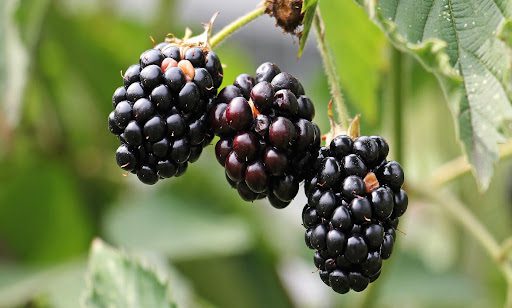Maine is known for its vast wilderness, rugged coastline, and delicious wild blueberries. But did you know that there are also blackberry patches all over the state? In fact, according to the University of Maine Cooperative Extension, blackberry production in Maine has increased significantly in recent years.
Blackberries are an excellent addition to any landscape, providing both food and beauty. They are perennials, meaning they will come back year after year and are relatively easy to care for. With a little bit of knowledge and effort, you can have a thriving blackberry patch of your own.
In this blog post, we will guide you through the steps of planting and taking care of blackberries on their property.
Plant Site Selection
The first step is to choose the right site for your blackberry plants. Blackberries need full sun, meaning they should get at least six hours of direct sunlight daily. Avoid low areas in your yard that stay wet for extended periods, as blackberries will not do well in soggy soil. It is also important to choose a site with well-drained soil. Blackberry plants have deep roots, so they need soil that is loose and not compacted.
You also need to ensure there aren’t any wild berries growing in your chosen area, as they may be disease carriers. If you’re unsure whether there are wild berries in the area, it’s best to err on the side of caution and choose another spot.
Blackberries also require adequate space to grow properly. Each plant should have about six square feet of space. If you are planting more than one row of blackberries, leave about six feet between each row. This will give the plants room to spread out as they grow.
Soil Preparation
After you’ve selected the perfect spot for your blackberry plants, it’s time to prepare the soil. Blackberries need nutrient-rich soil to thrive, so you may need to add some organic matter to your chosen site. Think about mixing in some sand or perlite to improve drainage. If you are unsure about the quality of your soil, it’s a good idea to take a sample to your local Cooperative Extension office and have it tested. This will give you an idea of what nutrients are lacking and how much organic matter needs to be added.
A pH of 6.0-7.0 is ideal for blackberry plants, so you may need to adjust the pH of your soil if it is too high or too low. This can be done by adding sulfur or lime to your soil, depending on your soil test results. Once you’ve added all the necessary ingredients to your soil, it’s time to till it. This will help mix everything and give the roots of your blackberries a good place to grow.
Purchasing Plants
Now that your soil is ready, it’s time to purchase your blackberry plants. Blackberries are usually propagated by root cuttings, so they are typically available as bare-root or potted plants. It’s best to plant bare-root blackberries in the early spring, just as they are beginning to grow. Potted plants can be planted at any time of year, but it’s important to water them regularly until they are established.
Blackberry plants are available in both thorny and thornless varieties. Thorny varieties are more resistant to pests, but they can be difficult to manage if you have small children or pets. Thornless varieties are easier to take care of, but they may be more susceptible to pests and diseases. Ultimately, the decision of which type of plant to choose is up to you.
When purchasing blackberry plants, make sure to inspect them carefully. Avoid any plants that have yellow or brown leaves, as this could be a sign of disease. You should also look for long canes with healthy buds. If you’re not sure how to select healthy plants, ask a nursery employee for help. Once you’ve found some good plants, it’s time to get them in the ground.
Planting Your Blackberry Plants
The best time to plant your blackberry plants is in the early spring, just as they are beginning to grow. If you can’t plant them immediately, keep the roots moist by wrapping them in a damp cloth. When you’re ready to plant, dig a hole that is twice as wide and deep as the root ball of your plant. Place your blackberry plant in the hole and backfill it with soil. Make sure to firm the soil around the base of the plant so that it is secure.
Water your blackberry plant deeply after planting. You should also apply a layer of mulch around the base of the plant to help retain moisture. Blackberry plants need to be watered regularly, especially during the first year. They should be given about an inch of water per week through rainfall or irrigation.
Caring for Your Blackberry Plants
Once your blackberry plants are in the ground, they will need some regular care to stay healthy and productive. Fertilize your plants in early spring with a balanced fertilizer such as 12-12-12. You can also add compost or manure to the soil around the base of the plant as additional fertilizer. Avoid using high nitrogen fertilizers, as this can encourage leaf growth at the expense of fruit production.
Weed your blackberry patch regularly to keep competition to a minimum. Mulching around the base of your plants can also help reduce weed growth. Blackberry plants are relatively drought-tolerant, but they will produce more fruit if given consistent moisture. Water your plants deeply about once a week during dry periods.
Pruning is an important part of caring for blackberry plants. Canes that have produced fruit should be cut back to the ground after harvest. This will encourage the plant to produce new canes that will bear fruit the following year. New canes should also be thinned out so that only the strongest ones remain. These canes should be spaced about 18 inches apart.
Harvesting Your Blackberries
Your blackberries will be ready to harvest when they are deep purple and soft to the touch. The exact time of harvest will depend on the variety of blackberries you are growing, but it is typically in late summer or early fall. Once your blackberries start ripening, check them daily and pick them up as soon as they are ripe.
Our Final Thoughts
We hope you have enjoyed reading this guide on how to grow blackberries in your Maine landscape. Blackberry plants are a great addition to any garden, and with proper care, they will produce bountiful crops of delicious berries for many years to come.
Do you want to add wild blackberries to your landscaping? We can help! Stone Solutions Maine offers top-notch professional garden landscaping in the greater Portland area. Call us today for a free estimate!

